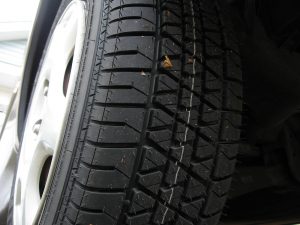 Not all tire are equal. Depending on the time of year, you should consider switching your tires to either snow, summer, or all-season tires to keep yourself safe on the road. Learn more about the differences among these tires and why it’s so essential to make the switch every season.
Not all tire are equal. Depending on the time of year, you should consider switching your tires to either snow, summer, or all-season tires to keep yourself safe on the road. Learn more about the differences among these tires and why it’s so essential to make the switch every season.
Snow Tires
Snow tires are obviously meant for you to use in the cold, winter months. They’re specially equipped to handle the unique problems facing drivers during wintry weather, such as black ice, freezing temperatures, and snowy roads. They provide this superior protection in several ways.
First, snow tires have different rubber than summer or all-season tires. These warmer-weather tires are made of stiffer rubber that freezes faster when the temperature drops. On the other hand, winter tires have more flexible rubber that stays malleable even when the temperature goes below freezing. This gives you more traction on the road.
Second, snow tires come with deeper tread and different tread patterns. This prevents snow from getting stuck in the tread by channeling it away from the tire instead of compacting it. Finally, the treads also come with biting edges that provide additional traction on slippery surfaces.
Summer Tires
If you’re looking for a high-performance tire, you’ll probably want a summer tire. These tires typically come with larger tread blocks as well as a stiffer rubber, which gives you more traction and tighter control over steering in warmer weather. They also have less grooving in the tread, so more of the rubber is on the road at any given point. Generally, they’re your top choice for speed and agility.
Additionally, because summer tires have enhanced aspect ratios, widths, and rim diameters, they are better for driving in wet weather. You’ll be able to enjoy better performance even when it’s raining.
All-Season Tires
While they don’t offer the high performance of summer tires or the cold-weather help of winter tires, all-season tires are a good option if you live in a mild climate or don’t have the financial means to switch your tires during the year. They won’t give you optimum performance in snow or ice or when making hairpin turns at top speeds, but they’re adequate enough to keep you safe in most conditions.
All-season tires come with moderate tread depths that are deeper than summer tires, meaning the tread will last longer. They also have the biggest variety of load capacities, models, speed ratings, and sizes, making them ideal for myriad vehicles. As for winter weather, they can provide you with enough traction to get by. However, if you anticipate bad weather, you’re better off switching to winter tires.
As you can see, choosing the right tires for your vehicle is essential for maintaining control while on the road. You never know what kind of conditions you might face, so be sure to switch your tires when it’s seasonally appropriate. Wintry weather or heavy rainstorms can pop out of nowhere, so don’t leave yourself unprepared.
“New Tires” by kalebdf is licensed by CC BY-NC-ND 2.0





